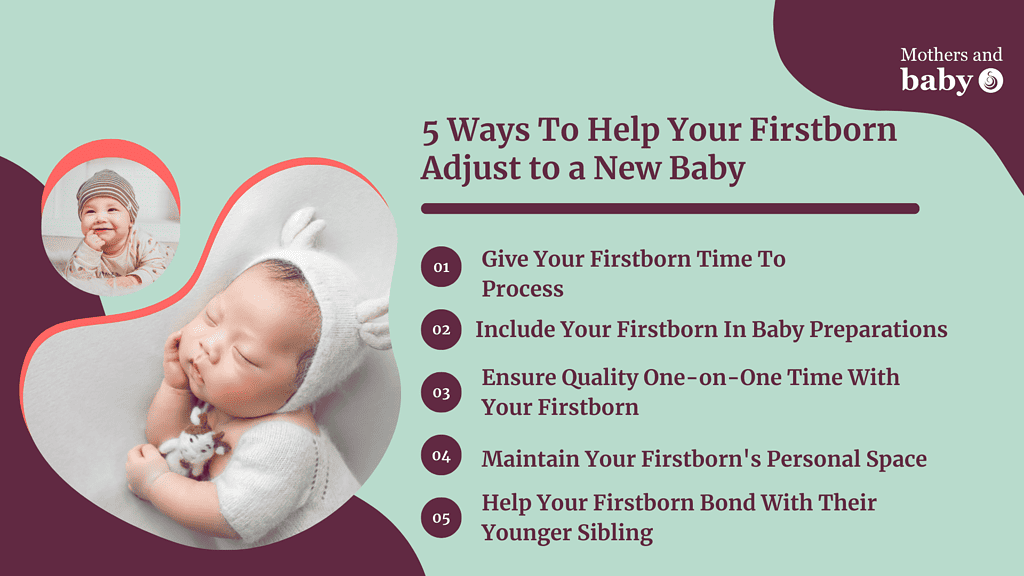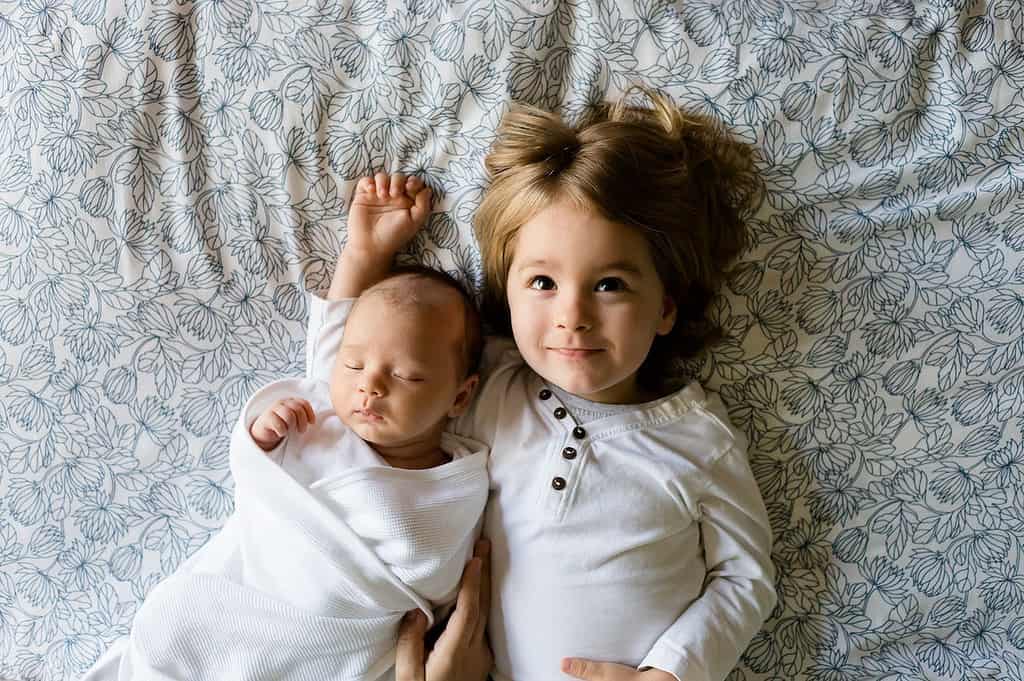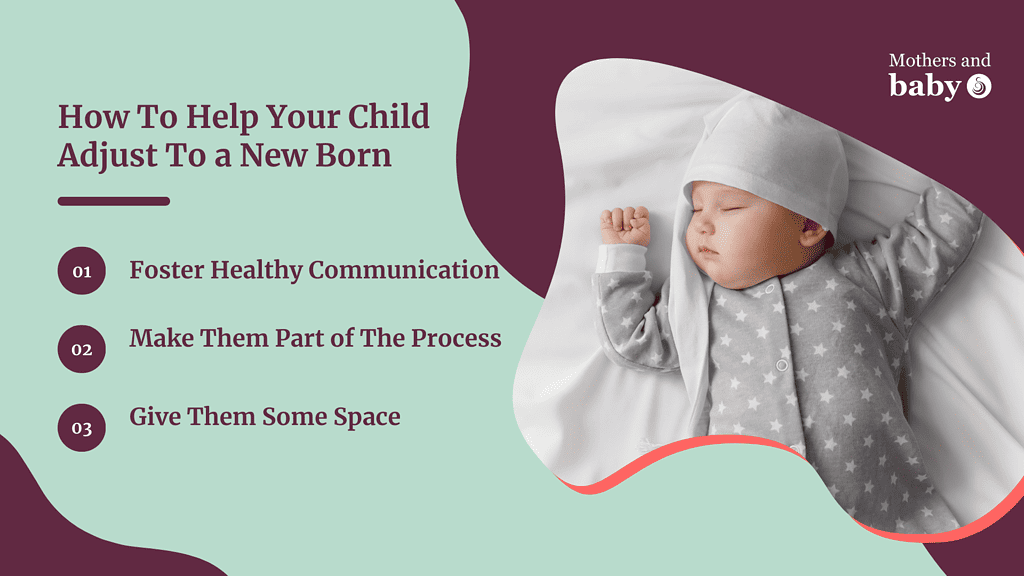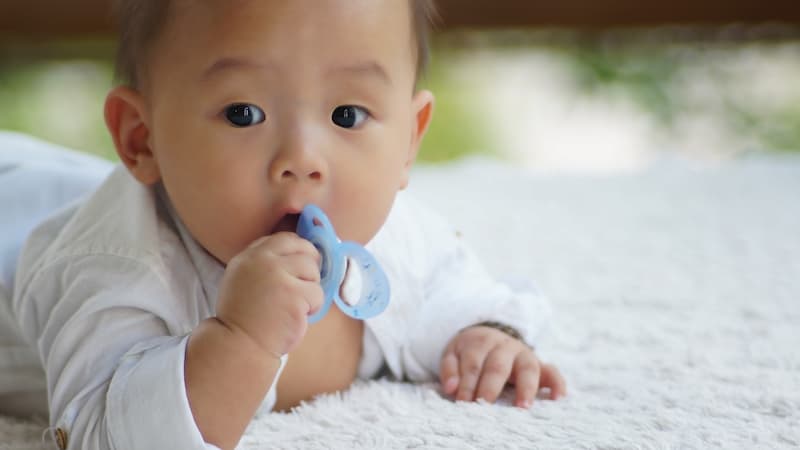Welcoming a new family member is exciting for parents and siblings alike. However, there are instances where you’ll need to start helping your fist born adjust to a new baby as they might have complex feelings about welcoming a new sibling. Preparing your firstborn child for a newborn’s arrival can go a long way in helping them adjust to the new family dynamic.
Part of ensuring everyone is ready for the arrival of a newborn is to talk to your firstborn about the changes that will occur. Talk to them openly and honestly about how their everyday life may change when a new baby arrives. Explain that the addition of another person in the family doesn’t mean being replaced. Still, rather it’s an opportunity for everyone to form closer bonds with one another.
This blog post will discuss tips for preparing your firstborn for a new sibling. These strategies can help minimise sibling rivalry and create a healthy, loving environment in your home that will benefit everyone involved.
Afterwards, you’ll have a nurturing and supportive method of introducing your firstborn to their new brother or sister.
So, let’s get started!
5 Ways To Help Your Firstborn Adjust to a New Baby
Helping your firstborn adjust to welcoming a new baby into the family takes patience, understanding, and preparation. Here are seven tips to help you get your little one ready for the big day:

Give Your Firstborn Time To Process
Giving your firstborn time to process becoming an older sibling goes a long way in calming any doubts or reservations they feel. One strategy you can apply is to talk about the baby often and with excitement. Children often mirror their parent’s emotions, so seeing you excited about the new baby can help your firstborn feel more positive.
Include Your Firstborn In Baby Preparations
Involving your firstborn in planning for the new baby is an excellent way to make them feel part of the process and build excitement. Depending on their age, you could ask them to pick out clothes, draw pictures for the nursery walls or even help you compile the list of items to purchase. Giving them a certain level of responsibility can be reassuring and help them build a relationship with the baby.
Ensure Quality One-on-One Time With Your Firstborn

Before your newborn baby arrives, reassuring your firstborn that you will still have dedicated one-on-one time with them is important. Taking the time to carve out a time of day to spend quality time with your firstborn reassures them that they still have that time once a new baby comes in. Creating that special time with them, despite the busy nature of caring for a newborn, prevents feelings of jealousy from arising.
Even 30 minutes between two parents can make a difference in how respective and accepting they will become of their new sibling. Also, spending time with your firstborn shows them patience in spending time with others, which will extend to their sibling once they are old enough to want to play with their older sibling. Have your partner schedule special activities with your firstborn.
This will help them learn how to be responsible and provide an opportunity to bond with their new sibling—even if it is from a distance. When you notice your oldest child feeling overwhelmed, validate their feelings and encourage them to discuss it. Doing so will allow them to feel they are being heard and that you value your children’s relationship.
Maintain Your Firstborn’s Personal Space
Families living in smaller spaces may need help rearrange their homes to accommodate a new family member. A two-bedroom living space is just enough for three people, and dividing that up for a baby’s room may cause your firstborn to feel like their personal space is no longer theirs.
Regardless of the challenge, it’s essential to establish personal space for your firstborn.
In cases where your firstborn needs to share a room with your newborn, create different spaces within the room to make your firstborn feel comfortable. This could range from turning a corner into a play area or having an art space for creative activities.
Help Your Firstborn Bond With Their Younger Sibling

Once your newborn baby arrives, taking the time to help your firstborn bond with their sibling is a huge step in building their familial bond with them. Let your firstborn spend one-on-one time with the baby, such as helping to change their diapers or playing with them. This will allow your firstborn to understand their role as an older sibling while reinforcing that they are just as important and loved by you as their new sibling.
Behaviours To Expect From Your First Child When The New Baby Arrives
While parenting is a delicate challenge, knowing that your firstborn has a strong and protective outlook in caring for their younger sibling takes a load off your worries. A child’s world constantly revolves around finding new and exciting ways to satiate their curiosity while spending time with their loved ones.
Most firstborns would even become too dependent on their parents and other relatives that they would become somewhat possessive. Knowing that it’s crucial to understand that every child is special and unique in that they can react quite differently from one person to another.
However, most children would have some personality changes when they realise that things will change once the new baby arrives. Most experts agree that there are specific ages wherein the older sibling might have a pattern when it comes to coercing them to the thought of having a baby sister or brother.
Here are some of the most common signs that you can expect many children would have when announcing that they have a baby brother or baby sister on the way:
Toddlers (Ages 2 and Below)

Young children, ages two and below, are often the most receptive to welcoming a new family member. Since toddlers at this age cannot yet process having an extra sibling, they have a more positive and accepting outlook on having another little one to spend time and play with!
However, expecting parents should still monitor their behaviour for any signs that there may be some underlying concern or anxiety about the arrival of a new family member.
Preschoolers (Ages 3-5)
By this age, children become more aware of what having a baby in the house means. Some may express joy or excitement as they get to be a big brother/sister. At the same time, some may show signs of anxiety and fear, such as regression (e.g., bed-wetting) or sadness at sharing their parents’ time and attention with another child.
Just remember that any signs of regression may be due to them seeking attention and reassurance from their parents. Parents should take the time to listen and provide comfort, even if this means extra cuddles and bedtime stories.
Parents must create additional opportunities for one-on-one time with their preschoolers as the baby’s birth approaches. This will ensure the child feels wanted and secure and help them bond with their new sibling.
School-Aged Children (Ages 6-12)

School-aged children are often excited about the new baby and may want to help by holding or feeding the baby. Usually, an older child will be very focused on whether their sibling is a boy or a girl. Finding out the new addition to the family aligns with their preference can go a long way in creating a strong bond. However, it will only sometimes be the case!
So, if your newborn is not the gender your child was expecting, providing them with a whole list of benefits to having the new baby can be beneficial. These benefits can include teaching the new baby their favourite games, being an example as they grow up and learning how to be a big sibling.
Handling an older child who seems resistant to accepting a new sibling is different. In this case, the focus should be empowering them to feel like helpful family members and not threaten their place. Encourage them to help with tasks such as holding the baby, taking care of dishes, putting away toys, or helping to dress the new baby.
Teenagers (Ages 13-18)
Having a new baby at home is often less exciting for teenagers and older kids. Teenagers are at an age where they want more independence and can take on the responsibilities of being older siblings. Still, they often feel like the new baby takes away those opportunities.
It’s important to ensure teenagers understand that having a new baby doesn’t diminish their role within the family. Help them find ways to continue being part of activities with younger siblings while pursuing their interests separately.
Make sure to include them in conversations, ask for their opinion on matters involving the new baby, and encourage them to take on new responsibilities such as helping with feeding or bathing the baby.
It’s also important to give teenagers space and time away from the family to break from feeling overwhelmed. Parents must ensure their school-aged children do not feel neglected as they adjust to the new baby. Parents should ask them for help and involve them in age-appropriate activities with the infant, like reading stories or singing songs together.
Another important factor to remember for teenagers is to temper their expectations on how much help they are expected to provide. It’s very tempting to hand off a handful of responsibilities to them in babysitting newborns.
However, remember that they may need to be fully developed to handle such a task. Strike a balance between helping out and making it seem like an uncontestable obligation. It’ll take a bit of negotiation t some points, but the results are well worth the effort in preventing disagreements.
How To Balance Time With The Older Sibling
Love for all family members is not something you would consider a challenge, especially in an openly loving household. However, a new baby can complicate things for the older child as competition might start to form when it comes to attention.
Although your child may or may not initially have strong feelings about becoming a big sister or brother, those feelings may change once they find that their parents will start to dote on one more than the other.
Babies need lots of care and attention to grow strong and healthy. As such, most of your time and focus would gravitate towards caring for the young child more. You must ensure you do not abandon your firstborn, no matter what happens.
Fortunately, proper communication and inclusion in specific activities can help bring about a more positive attitude towards becoming a great big sibling. By allowing your firstborn to raise the newborn, you can help them feel as though their attention and help are desired and appreciated and help prevent sibling rivalries from forming.
Take the time to let them develop a personal relationship with their new baby sibling since they would most likely spend the rest of their lives closer to each other than any other family member. It is critical to allow criticism and advice from all sides of the household to ensure that every member feels they have a voice.
What You Can Do To Help Your Older Child Adjust
Older children would always feel like they lose part of their joy once a new arrival occurs. This feeling is common, considering that most have adjusted to life as the centre of attention. The sudden change in landscape, environment and even behaviour that an older child will receive can be quite challenging.
Although some children can find the time to take every new change in stride, others might find the situation too complex to deal with. Fortunately, there are a couple of ways to help alleviate the qualms and worries of your firstborn.
Take this information for educational purposes and not as the only possible way to make your child understand the concept of having a new sibling.
Here are some of the best ways you can make the process easier to manage before the baby’s arrival:

Healthy Communication
You cannot make a random announcement that your firstborn would have to share their parents with someone else. How your child would react can vary wildly depending on many factors. However, most of these outbursts cannot go unnoticed as they need to find some way to express their innermost feelings about the situation in a more positive light.
You can make the transition clearer and easier by opening the doors for healthy communication between parent and child. When dealing with children, the crucial thing to consider is to explain the concept of becoming the oldest child at home and helping raise and protect their new sibling.
Since your little one will soon grow to become attached to your firstborn, you want to ensure that they feel calm and loving with the latest addition to the family.
Make Them Part of The Process
Most firstborn children think the world revolves around them since they have nobody else to share attention with. Once a new baby comes into play, they might see them as someone that wants them out of the picture. You need to ensure that your older child will feel secure in their place as part of the family.
One of the best ways to make this process easier than ever is to ensure that your older child can have some input when making decisions around their new baby sibling. Although you do not always have to consult your child for choices they cannot comprehend, it does help to boost their confidence that they have what it takes to help raise a little one.
Give Them Some Space
Sometimes a simple understanding that your firstborn will need some space can help prevent things from escalating too quickly. It would help if you made time for all your children regardless of who comes first. However, constant focus on the new baby or even frequent mentions of their new sibling can cause the older child to feel neglected or compared to others.
Other parents may sense that some favouritism will go around the home. Let your older child bond with their friends to take their mind off the sudden change around the family. Do note that you still need to learn where to strike the right balance between doting and neglect to prevent any unnecessary issues growing up.
Key Takeaway
Helping your firstborn adjust to a new baby takes patience, understanding, and clear communication. Foster a nurturing and balanced environment to ensure your child feels secure and loved. Such an environment can include setting aside quality time with them, ensuring they have a strong social circle, and respecting their emotions. With the right approach, your firstborn can successfully transition into their new role as a big sibling!







